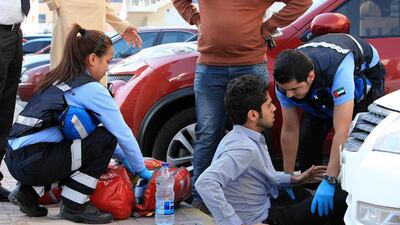With the National Ambulance:
- National Ambulance project provides better services to Northern Emirates
- National Ambulance call handlers trained for stressful situations
- Northern Emirates residents praise ambulance crew for saving lives
- Paramedics in action in the Northern Emirates - in pictures
_____________________________________________________________
AJMAN // It is 11.17am. The steady hum of activity in the National Ambulance’s Ajman base is silenced when the on-call radio crackles into life.
As a call handler from the ambulance service’s Abu Dhabi control room informs those on duty of a 999 emergency in the Northern Emirates, the Emergency Medical Technicians (EMT) fall silent to determine if they are the closest located team to be dispatched. It is the calm before the storm.
The radio crackles again. Team number 32. EMTs May Glicerie Book and Mohammad Rawashdeh jump into action.
Little is known about the emergency at this stage, except that a woman is unconscious.
“When you get a call saying a patient is unconscious, you expect the worst,” says Farhan Husain, area manager for Ajman and rural Sharjah.
“It could be a cardiac arrest, a drug overdose, anything.”
It is 11.21am. The EMTs have navigated the dense traffic and dusty roads to their destination. There is an office block near by.
Ms Glicerie Book is armed with her trusty red duffel-bag. Each emergency worker has one and they are filled with the tools needed when responding to a call: rolls of gauze, a kit to check a patient’s vital signs, and medicine, to name but a few.
They reach their patient. An Emirati is slumped in a car, unresponsive. She collapsed at work. She has recently been stressed, according to her concerned colleagues.
Ms Glicerie Book and Mr Rawashdeh get to work. They work seamlessly together, checking her vital signs.
They signal to their supervisor that everything is normal. While she has a slightly elevated heart rate, nothing would suggest she has gone into cardiac arrest or anything of a serious nature.
The sirens blare as the patient is transferred from the wheelchair to a stretcher and into the back of the ambulance to be taken to a nearby hospital for a more thorough check-up
The patient, Mr Husain says, has most probably suffered a panic attack.
“You learn to just be able to tell,” he says. “The team will get one or two of these calls a day.
“You want to take the patient out of the situation that is making them anxious or stressed.”
Ajman is covered by four teams of four who operate on 12-hour shifts. They work four days on, four days off and are separated into red, blue, green and yellow.
Similar operations run across the other emirates to provide residents with 24/7 emergency medical coverage.
Ms Glicerie Book and Mr Rawashdeh, partners in the yellow shift, began work at 7am and by 8.18am had their first call.
A 24-year-old man complained of severe abdominal pains after going to the gym and phoned 999 for help.
He was taken to a nearby emergency department as a precaution.
After the 11.17am job, the next comes at 3.30pm. A car accident. One casualty.
Until they arrive at the scene, the EMTs often do not know the severity of the injuries they may encounter.
Fortunately, the patient has only minor injuries and is taken to hospital as a precaution.
Radio chatter shows the work other aid workers are doing in the area. A large industrial fire, several road traffic accidents, a wide range of medical emergencies.
Despite some of the challenges covering the Northern Emirates presents, such as the lack of a proper system of street addresses and the dense traffic, Mr Husain says response times for most incidents in Ajman fall below the eight-minute mark. This means that the National Ambulance is performing in line with international standards.
The service in the Northern Emirates is making a huge difference, says Mr Husain.
“I cannot tell you what was here before.
“However, from patient feedback, we know we are making a huge difference. The difference is felt night and day.”
_____________________________________________________________
About this story:
February last year, Sheikh Saif bin Zayed, Deputy Prime Minister and Minister of Interior announced the National Ambulance project. Since then the Northern Emirates has seen massive improvements in services in spite of dense traffic and the lack of a proper addressing system.
Call handlers are the first point of contact: their jobs are to glean vital information so that an emergency medical technician response can be sent as quickly as possible. They are also trained to remain calm in stressful situations and to keep callers from panicking.
The expanded network has meant that response times for the majority of incidents now fall under the eight-minute-mark — meaning the National Ambulance are performing in line with international standards.
With the National Ambulance:
- National Ambulance project provides better services to Northern Emirates
- National Ambulance call handlers trained for stressful situations
- Northern Emirates residents praise ambulance crew for saving lives
- Paramedics in action in the Northern Emirates - in pictures
jbell@thenational.ae

